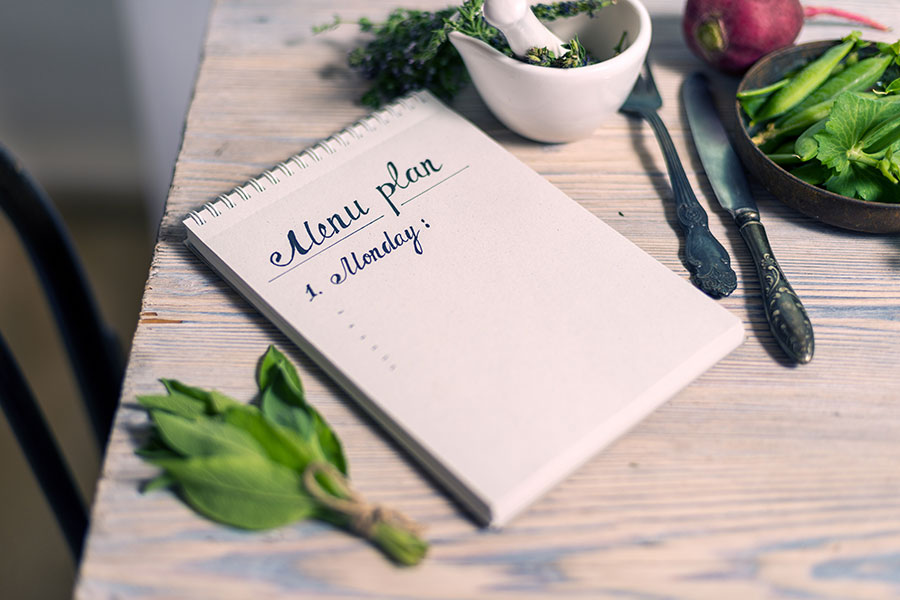After successfully finishing the work day, picking up the dry cleaning, and picking up the kids from practice, you find yourself like many others–smack in the middle of a lava-flow of traffic desiring for nothing more than to kick-back and relax back in the comfort of your home. After the many stop-and-goes, you glance at what was quite possibly the fourth or fifth billboard showcasing yet another fast-food advertisement. Suddenly, half-way home you realize that you have yet to solve the dreaded-dilemma of figuring out what’s for dinner? In many cases, you are left with the undesirable options of Sunday night leftovers or some mystery frostbitten contents in the freezer from who knows when? On demanding days like these, convenience is often the motivating factor when making a decision on what to eat. But what if I told you these moments could be avoided?
Maintaining healthy habits when it comes to diet for you and your family is similar to creating unhealthy ones. Consider this: in the split moment when you’ve finished work and are scrambling to think of what to make for dinner, most decisions are made from a convenience-driven mentality, even if it results in compromising goals towards a healthier you. This isn’t to say you should completely override eating out. This is simply a gentle reminder that it is often easier to make better decisions for our health when we make efforts to prepare to have better options more accessible and convenient for us.
It is far more appealing to swing through your local drive-through than it is to think about hovering over a hot stove after a taxing day at work. As convenient as it is to make unhealthy food choices, meal-prepping offers that similar convenience when approached with the same goal in mind.
The goal in this case, is to maintain good eating habits without having to put too much thought behind it, right? What if I told you meal prepping could be more than just steamed veggies and roast chicken piled high in your refrigerator? With a few pointers, meal-prepping could be the easiest decision you could ever make.
Below are some benefits and tips for the beginners out there and a new perspective for others who have the meal-prepping habit already under their belt.
Benefits of eating from home:

1. Control what is in your food.
Eating out may be convenient, but it often includes excessive amounts of processed ingredients that include trans fats and higher amounts of sodium and/or processed sugar. Cooking from home allows you to see what and how much you’re putting on your plate.
2. Spend more time with the family.
Meal-prepping doesn’t all have to fall on one person. Getting the kids or your partner involved in washing or cutting produce for your meals can be both interactive and more time-efficient. Including other members in the household for what is on this week’s menu is another great way to get more people involved in the kitchen.
3. Save money.
According to The Bureau of Labor Statistics reports, “as of 2018, the average household spends an average of $ 3,365 per year on dining out alone,” over time what you make up for convenience many households lose in long-term savings.
Execution Time!

1. Prep according to your schedule.
Determining how many meals you are going to prepare ahead of time ultimately comes down to the need at hand. I find it best to make this decision after asking myself what part of the day is the most demanding? If mornings are an impossible to time to cook, consider meal prepping with a couple of options you can grab and go before you start your day. If you can anticipate afternoons or evenings being more hectic, then do the same according to what your schedule demands.

2. Commit to prepping one meal a week.
Small steps to healthier living are more sustainable and also less intimidating when first beginning the meal-prepping process. Meal-prepping a whole week’s worth of breakfast, lunch, and dinner plus snacks is a bit of a daunting task for some, and quite honestly, maybe a bit excessive when you are just starting out. Commit to meal-prepping one meal based on your schedule and when you have become more accustomed to this new healthier habit, you can always add on an additional meal or snack to the mix. After a while, you’ll soon be able to conquer multiple meals or days if needed.

3. Purchase seasonally.
It’s completely understandable to have specific preferences in food choices and this might differ depending on what kind of diet you adhere to on a daily basis. Rule of thumb: for more cost-efficient shopping, purchase produce and other items that are within season. Doing so ensures the best quality of ingredients and more reasonable prices than say trying to stock on strawberries in the middle of December.
Although this is just some basic insight to meal prepping and its advantages, it is a great start towards a healthier more stress-free-you that can be something experienced and beneficial for you and the entire family! The goal couldn’t be more clear – experience living healthy together.
1United States, Congress, He Division of Consumer Expenditure Surveys. “Economic News Release; Bureau of Labor Statistics.” Economic News Release; Bureau of Labor Statistics, U.S. Government Publishing Office, 2018, p. 1.
Recommended Reading
LA Fitness 4th of July and Canada Hours 2022
LA Fitness will be open for Independence Day and Canada Day! Modified clubs hours are below!Holiday Hours (U.S.) Monday, July 4th: 8AM - 4PM Tuesday, July 5th: Normal Hours Holiday Hours (Canada) Friday, July 1st: 8AM - 4PM Saturday, July 2nd: Normal Hours ...
LA Fitness Holiday Hours 2021
LA Fitness will be open for parts of the Holiday Season! Modified clubs hours are below!Holiday Hours (U.S.) Friday, December 24th: 8AM - Noon Saturday, December 25th: Closed Friday, December 31st: 8AM - 6PM Saturday, January 1st: 8AM - 6PM Holiday Hours...
3 Year Anniversary – Living Healthy Podcast Update
Today is the 3rd Anniversary of the Living Healthy Podcast, presented by LA Fitness. Hi everyone! I just wanted to give you a quick update on what is going on with the show. We are trying to plan out 3 LIVE podcast episodes covering Exercise, Nutrition, and Sleep...


